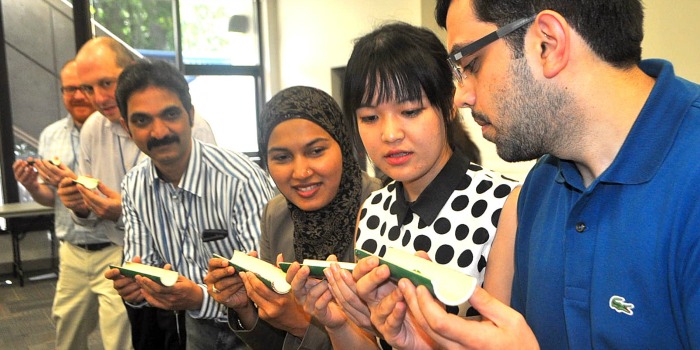In terms of Resistance, Dr. Asare cites several reasons why employees are hesitant to take on the course. Employees don’t believe that actual changes can be made (maybe they read too many “diversity training doesn’t work headlines?”), they may feel victimized, or may feel singled out as a member of a diverse group.
It is no small deal if you have employees who feel victimized or isolated as a member of a diverse group. What may be difficult is recognizing these issues, especially if team members are shy or reluctant to speak up for themselves. The good news is there is an easy fix to get people engaged. Before the often pricey diversity and inclusion program begins, you can make much headway by involving your team in an affordable interactive team experience that involves everyone and is fun for everyone, regardless of culture or background.
The most common complaints we hear from HR staff is a lack of trust and poor communication;. communication. We have a relatively quick remedy whether the team works in person or remotely. Escape the Case has been explosively popular, as well as our Cyberspace virtual team challenge for remote teams. in engaing teams in a positive, fun and non-threatening way.
One thing we stress with D&I trainers is that if you want a receptive audience, participants must not be forced to take the training session. It must be voluntary. We are happy to say 100 percent of the people who have participated in our “pre-diversity training” team building event has been willing to engage in their company’s diversity and inclusion training with the team they just had so much fun with.
Dr. Asare says when “individuals feel like they don’t have a choice, this can lead to resistance and opposition”. So true. Give them a choice, with a Venture Up team building event beforehand, and you can expect them to jump on the train.
Improper implementation is evident, Dr. Asare asserts, when programs “point the finger and paint one group as the villain”. This is also evident in the divisive politics we experience in the USA today. There is nothing worse than dividing people if you want unity. Dr. Asare suggests mentorship and sponsorship programs may be effective, as well as conducting a needs assessment when designing the program.
In many cases a scandal propels a company to a knee-jerk reaction to introduce a diversity program, with little thought as to how it ties into to the company’s current culture. The reaction can come across as inauthentic, she says. If D&I programs are consistent, vs. a one-shot deal or band-aid to fix a damaged reputation, the approach is more authentic and employees will more likely trust in the company’s commitment to D&I.
The lack of lack of leadership buy-in is a common obstacle to D&I success. Leaders, generally the Type As tend to be rigid and resist change, or doubt change is possible. Or they simply don’t get it. They may consider D&I a ‘feel good’ program with reputational, but no monetary benefits. There are other benefits to ongoing D&I programs. Employee recruiting and retention for one. Today’s employees want to associate their work with a socially responsible company, sensitive to the need for workplace harmony and mutual respect. Diversity fosters the innovation a team of clones could never match. Today’s leaders need to be flexible to survive and be open to the backbone that supports the organization. When leadership reflects diverse backgrounds, the customer base is more likely to expand into more demographics and markets.
Dropping the diversity label may fend off resistance to the D&I program. Labels often bring images of expectations, often unattainable. In this highly-judgmental world, especially of late, people are fear being criticized or cancelled, God forbid. They may feel they will be trapped in a corner, in a Catch-22 where they cannot win if they are disparaged for immutable characteristics. What all human beings need to flourish — in organizations, families and individual relationships — is acceptance of differences, respect and support for one another. An open mind, an open heart.

